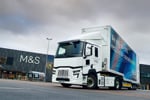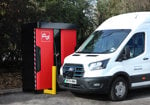The offer of a company car developed rapidly in the 1970s as a tax-efficient way for employers to reward staff without raising salaries.
A new survey covering more than 200 firms has identified a 13% year-on-year rise in the number of firms that think company cars will retain their importance in employing and holding on to key employees.
It also reveals that 86% of employees eligible for a company car take up the option, showing the launch of carbon dioxide-based company car tax, may even have increased the appeal of the company car, particularly in the perk sector.
Indeed, the GEE Guide to Company Cars 2002/3 suggests that the company car has become more attractive as a core employee benefit.
'In the light of widespread pay freezes, two-thirds of respondents believe company cars will retain their influence,' it said. 'Perk or status cars are also becoming more popular, as low mileage drivers realise the new tax regime works in their favour.' The survey revealed that 76% of employees eligible for a perk car take up the offer, an 8% rise on last year.
Cherry Park, report author, said: 'This year has been key in demonstrating the effects of the new tax system. It has shown that drivers are not willing to compromise their cars, despite the cost implications. Overall, the company car seems likely to retain its appeal to drivers and it is experiencing a surge of popularity.'
The survey also showed that 20% of firms thought business-need drivers who had taken cash for car would opt back into company cars, along with 39% of perk car drivers in the same position.
The report added that 56% of firms still see the company car as a benefit to business drivers, while 31% now believe the benefits are marginal. For perk drivers 66% believe there is a benefit, while 22% say it is marginal.
GEE questioned 236 organisations, with a combined fleet of 17,371 cars, and found that fewer respondents believe the number of company cars they run will reduce because of drivers taking the cash alternative.
However, 42% of respondents did forecast that fleet numbers would fall, although this was a lower proportion than the 48% last year. And 13% say the company car is no longer a benefit for business drivers, up from last year's 5%.
Stewart Whyte, director of the Association of Car Fleet Operators, warned: 'There are lessons to be learned from history in the provision of company car, particularly to perk users. It is very easy for companies to provide someone with a company car, but should business become difficult, it is very difficult to ever take it away again.'















Login to comment
Comments
No comments have been made yet.